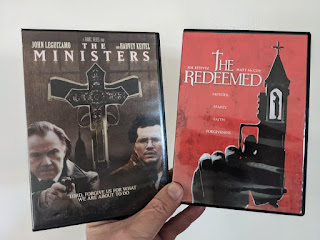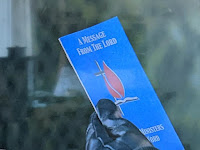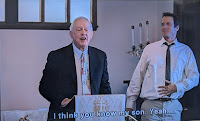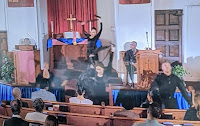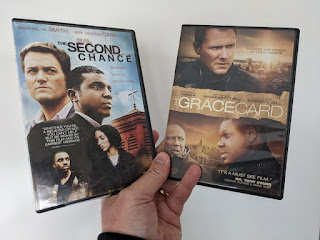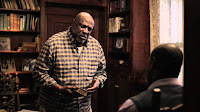The Ministers (2009) and Act of Contrition (The Redeemed) (2019)
I wonder how many other people in the world have seen both films I watched for this week’s Movie Churches. I don’t think there are a great many people in the world who have heard of both of this week’s films -- or either of this week’s films. They're not on most of the streaming services, but you can look them up on IMDb. As you can see by the photograph, they do exist in DVD form. In fact, I purchased them for this blog.
During Movie Churches' seven-year life, we've looked at a mix of obscure films and classics, very popular contemporary films and widely ignored modern movies. We’ve featured The Godfather and Sound of Music, as well as Oscar winners like Spotlight while they were still in the theaters. Sometimes we’ve featured wonderful (and awful) foreign films that were well known in their homelands, but not so well known here in the U.S. Some films we've talked about caused a stir back in their day, but are now widely forgotten.
The whole point of this blog has been to bring those in the church to consider how they are portrayed in the world and to bring some filmgoers to consider the accuracy of the portrayals of the church and clergy in what they viewed. But what about films that have, it seems, no cultural impact whatsoever?
On the other hand, a great number of people devoted time, energy, talent, and funds to bring these pictures about, and it does seem the filmmakers were trying to say something about issues of faith, so more power to ‘em, I guess.
2009’s The Ministers is about twin brothers (played by John Leguizamo) who want to avenge their father’s death. He was murdered by corrupt cops (among them Harvey Keitel). The brothers commit a number of other jobs, often of the vigilante variety, leaving behind religious tracts that their late father had used. Their father, a minister who cared for his community, would almost certainly have been displeased by his sons' actions.
The Ministers pray for forgiveness before they go out to do their killings, but I don’t think that’s how it’s supposed to work -- the Lord’s Prayer doesn’t say, “Forgive our upcoming transgressions.” They also quote Scripture, even at the scene of the crime, which in my book makes what they do worse rather than better.
2019’s Act of Contrition (aka The Redeemed) stars Joe Estevez as a gangster who tries, on the last day of his life, to return to his estranged family. There are abundant voiceovers and flashbacks in the film but I’ll admit I had great difficulty following the plot. (Usually, when I have trouble discerning a plot point, I go to Wikipedia’s film summary, but The Ministers had a two-sentence plot summary and Act of Contrition was not to be found.)
Father Victor (Gregory Patrick Agnew), a priest, lies to the authorities to cover for his family. He also has a history of drinking problems and yet pulls out a bottle when visiting a member of the family in the hospital (“for old time’s sake”). Another priest, Father Boyle (Matt McCoy) says about him, “He is a spiritually charged, renegade priest.” But he seems like a poor representative of his faith to me.
So what do we have for Steeple Ratings for these two films? The pastor we see briefly in flashbacks in The Ministers seems decent enough, so we’ll give him three steeples. (His parenting skills -- raising murderers who expect preemptive forgiveness -- brings him down a bit.) Father Victor in Act of Contrition earns a meager two steeples.
This is the last weekly review for Movie Churches, but next week we’ll start a month of review starting with the worst films in our seven-year history.
The whole point of this blog has been to bring those in the church to consider how they are portrayed in the world and to bring some filmgoers to consider the accuracy of the portrayals of the church and clergy in what they viewed. But what about films that have, it seems, no cultural impact whatsoever?
On the other hand, a great number of people devoted time, energy, talent, and funds to bring these pictures about, and it does seem the filmmakers were trying to say something about issues of faith, so more power to ‘em, I guess.
2009’s The Ministers is about twin brothers (played by John Leguizamo) who want to avenge their father’s death. He was murdered by corrupt cops (among them Harvey Keitel). The brothers commit a number of other jobs, often of the vigilante variety, leaving behind religious tracts that their late father had used. Their father, a minister who cared for his community, would almost certainly have been displeased by his sons' actions.
The Ministers pray for forgiveness before they go out to do their killings, but I don’t think that’s how it’s supposed to work -- the Lord’s Prayer doesn’t say, “Forgive our upcoming transgressions.” They also quote Scripture, even at the scene of the crime, which in my book makes what they do worse rather than better.
2019’s Act of Contrition (aka The Redeemed) stars Joe Estevez as a gangster who tries, on the last day of his life, to return to his estranged family. There are abundant voiceovers and flashbacks in the film but I’ll admit I had great difficulty following the plot. (Usually, when I have trouble discerning a plot point, I go to Wikipedia’s film summary, but The Ministers had a two-sentence plot summary and Act of Contrition was not to be found.)
Father Victor (Gregory Patrick Agnew), a priest, lies to the authorities to cover for his family. He also has a history of drinking problems and yet pulls out a bottle when visiting a member of the family in the hospital (“for old time’s sake”). Another priest, Father Boyle (Matt McCoy) says about him, “He is a spiritually charged, renegade priest.” But he seems like a poor representative of his faith to me.
So what do we have for Steeple Ratings for these two films? The pastor we see briefly in flashbacks in The Ministers seems decent enough, so we’ll give him three steeples. (His parenting skills -- raising murderers who expect preemptive forgiveness -- brings him down a bit.) Father Victor in Act of Contrition earns a meager two steeples.
This is the last weekly review for Movie Churches, but next week we’ll start a month of review starting with the worst films in our seven-year history.
